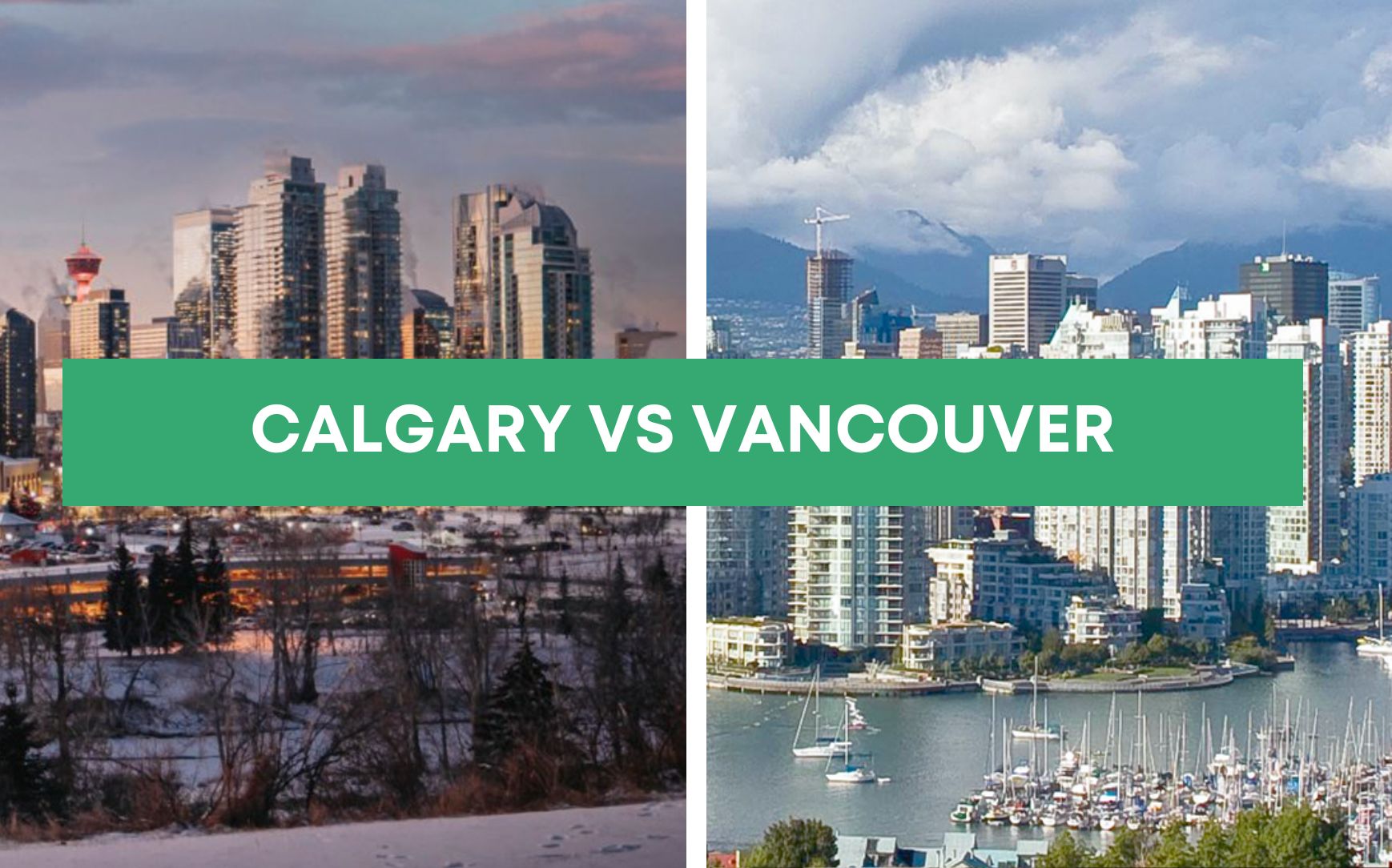Introduction to Calgary and Vancouver
Calgary and Vancouver, two of Canada’s most prominent cities, offer distinct experiences to their residents. Calgary, known for its cleanliness and smart infrastructure, is ideal for young couples and families due to its affordability and cosmopolitan lifestyle. Meanwhile, Vancouver is celebrated for its natural beauty and relaxed pace of life, offering a balance that attracts those who enjoy outdoor activities.
Overview of Calgary
Calgary, located in Alberta’s transitional area between the prairies and Rocky Mountain foothills, presents a unique blend of urban and natural landscapes. The city is notable for its extensive parkland, including along the Bow and Elbow Rivers, and for being affordable for a major city. The sunny weather and proximity to the Rockies add to its appeal.
Overview of Vancouver
Vancouver, in contrast, is a coastal seaport city in British Columbia, known for its condensed and densely populated urban environment. Its dramatic skyline is due to the natural limits imposed by water, which restricts city sprawl. The city’s appeal includes the North Shore Mountains, Stanley Park, and proximity to the Pacific Ocean. Vancouver is recognized for its mild climate, which is milder than typical Canadian winters, although it is prone to rain.
Livability Rankings
In terms of livability, both cities rank highly on a global scale. In 2023, Vancouver ranked fifth and Calgary seventh in the Economist Intelligence Unit’s Global Liveability Index. Vancouver scored particularly high in healthcare and education, with strengths in culture, environment, infrastructure, and stability. Calgary’s strengths were in stability, healthcare, education, and infrastructure, though it scored lower in culture and environment.
Housing Costs: Calgary vs Vancouver
When comparing the cost of living in Calgary and Vancouver, housing costs are a significant factor. Here’s an in-depth look at the housing market in both cities as of 2023.
Calgary Housing Market Overview
- Average Home Price: In November 2023, the average home price in Calgary was $540,106. This represents a 10.2% increase compared to the previous year and a slight 1% decrease from the previous month.
- Detached Homes: The average price for detached homes was $723,478, a 16% yearly growth.
- Semi-Detached and Townhouse Prices: Semi-detached homes averaged at $630,922, showing a 7.5% annual increase. Townhouses were priced around $404,386, a 13% rise from the previous year.
- Apartments/Condos: The average price for apartments or condos was $315,060, up 7.8% from the previous year.
- Benchmark Prices: The benchmark prices showed significant growth, with detached homes at $699,500 and semi-detached homes at $628,700.
- Median Prices: Median prices also showed an upward trend, with detached houses reaching $650,000, a 16% annual increase.
Vancouver Housing Market Overview
- Average Home Price: In Greater Vancouver, the average home price was $1,285,414, a 7.2% annual increase and a slight monthly decrease.
- Benchmark Prices: The benchmark price for homes in Metro Vancouver was $1,185,100, representing a 4.4% yearly increase.
- Detached Homes: The average price for detached homes was significantly higher, at $2.24 million, marking a 10% increase from the previous year.
- Attached Homes and Condos: Attached homes averaged at $1.21 million, while condo apartments were priced at $811,000, showing a 5.4% year-over-year increase.
Comparative Analysis
Comparing the two cities:
- Calgary is More Affordable: Overall, Calgary is approximately 9% cheaper than Vancouver in terms of living costs. This difference is most pronounced in the housing market, where Calgary’s housing is 15% cheaper than Vancouver’s.
- Vancouver’s High Housing Prices: Vancouver’s housing market is characterized by significantly higher prices, especially for detached homes, reflecting the city’s natural beauty and limited space for expansion due to its geographical location.
The stark contrast in housing costs between Calgary and Vancouver is an important consideration for anyone contemplating a move to either city. Calgary’s affordability, especially in housing, presents a strong case for those seeking a balance between urban living and financial viability. On the other hand, Vancouver’s high housing costs are offset by its natural beauty and mild climate, appealing to those who prioritize these aspects.
Daily Living Expenses in Calgary and Vancouver
Analyzing the daily living expenses in Calgary and Vancouver provides insight into the cost-effectiveness of both cities. Let’s compare various aspects of daily expenses as of 2023.
Food Costs
Food expenses in Calgary are generally 9% cheaper than in Vancouver. For example, basic lunchtime menus, fast food meals, and groceries like chicken, milk, and eggs are less expensive in Calgary. However, certain items like tomatoes and apples are more costly.
Housing and Utilities
Housing in Calgary is 15% cheaper than in Vancouver. The monthly rent for furnished accommodations in both expensive and normal areas is lower in Calgary. Utilities for a month, covering heating, electricity, and gas, are notably higher in Calgary at C$330 for a two-person household in an 85m2 flat, compared to C$150 in Vancouver. For a single person in a smaller studio, the utility costs in Calgary are C$167, compared to C$81 in Vancouver.
Clothing
The cost of clothing is relatively similar in both cities, with specific items like jeans, summer dresses, and business shoes being slightly cheaper in Calgary. The differences range from 12% to 19% depending on the item.
Transportation
Transportation in Calgary is 8% cheaper than in Vancouver. This includes the cost of vehicles, gasoline, public transport tickets, and taxi fares. The significant difference is seen in gasoline prices, which are 28% lower in Calgary.
Personal Care
Personal care items are 13% cheaper in Calgary. This includes common items like cold medicine, antibiotics, private doctor visits, and toiletries. The cost of a standard men’s haircut is notably higher in Calgary, at C$36 compared to C$23 in Vancouver.
Entertainment
Entertainment costs are similar in both cities, with slight variations in specific activities. For instance, dining out, movie tickets, and theater tickets are comparably priced, but Calgary shows a slightly higher cost for Italian restaurant dinners and club drinks.
Overall Comparison
Overall, while Calgary offers a more affordable cost of living in several categories like food and personal care, Vancouver has advantages in lower utility costs. The differences in transportation and entertainment are relatively minor. These factors combined paint a comprehensive picture of daily expenses, highlighting Calgary’s affordability in many aspects of day-to-day life compared to Vancouver.
Employment Opportunities and Income Levels in Calgary and Vancouver
Calgary’s Job Market
Calgary’s job market has shown significant growth, particularly in the technology sector, with several key developments:
- Global Consulting and IT Services: In September 2022, a major global consulting and IT services company announced plans to bring 1,000 jobs to Calgary over two years, aiming to double its Canadian workforce to 8,000 by 2024.
- IT Solutions and Quantum Computing: An IT solutions provider specializing in cloud and cognitive services plans to create 1,000 jobs within five years, focusing on local talent, in partnership with the University of Calgary’s Quantum City quantum computing learning space.
- Fintech and AI Innovations: A global fintech firm, Sidetrade, opened its North American headquarters in Calgary, planning to invest $25 million and bolster the job market with its AI-powered platform for order-to-cash operations.
- IBM Client Innovation Centre: Opened in February 2023, this centre is the first in Western Canada, aiming to create 250 to 430 new jobs in AI, hybrid-cloud, 5G, and security within five years.
- GPS and Fitness Technology: A company known for GPS, fitness, and outdoor technologies is expanding, with nearly 200 new STEM jobs projected.
- Business Consulting and SAP Software: Applexus, a global business consulting firm, chose Calgary for its Canadian headquarters, planning to create over 100 jobs in the next five years with a $3 million investment.
Vancouver’s Job Market
Vancouver, on the other hand, has faced some challenges but also exhibits growth in key sectors:
- Employment Growth: There was a modest increase in net total employment from April to May 2023, with an unemployment rate slightly above 5%. Legislative and senior management occupations saw the most significant employment gains.
- Economic Forecast: The real GDP of Metro Vancouver is forecasted to reach $158 billion in 2023, with a 0.5% annual growth, and expected to accelerate to 2.8% in 2024.
- Business Recovery: Post-COVID-19, businesses in Metro Vancouver have been recovering, especially in construction and professional, scientific, and technical services, surpassing pre-pandemic levels.
- Key Economic Sectors: Vancouver’s economic growth has been driven by construction, technology, digital entertainment, and the green economy, positioning it as a leading low-carbon economy in North America.
In summary, both cities offer unique employment opportunities and are experiencing growth in various sectors, with Calgary emphasizing technological and business services expansion and Vancouver focusing on sustainable growth in construction, technology, and green sectors. This comparison reflects the evolving job markets and economic landscapes of Calgary and Vancouver, offering insights for those considering employment opportunities in these cities.
Lifestyle and Recreational Costs in Calgary and Vancouver
Food and Dining
Comparing food and dining costs, Calgary and Vancouver exhibit subtle differences:
- Average Monthly Food Expenses: In Calgary, the average food expense is $569, while in Vancouver, it’s slightly higher at $611.
- Eating Out: A lunch menu in Calgary costs around $16.1 compared to $16.5 in Vancouver. Dinner for two in a restaurant is more expensive in Vancouver ($75.1) than in Calgary ($64.3).
- Fast Food and Drinks: The cost for a fast-food meal like McDonald’s is almost equal in both cities, around $9.8. However, a beer in a pub is marginally cheaper in Calgary, and the same goes for a cappuccino and soft drinks.
Grocery Prices
Grocery items show variances between the two cities:
- Basic Grocery Items: Items like milk, bread, rice, eggs, and cheese are generally cheaper in Calgary. For example, a liter of milk costs $1.91 in Calgary and $2.58 in Vancouver. Similarly, a dozen eggs cost $3.58 in Calgary and $4.58 in Vancouver.
- Meat and Produce: Chicken breast and round steak are more affordable in Calgary. Prices for fruits like apples, bananas, and oranges also tend to be lower in Calgary.
Utilities and Transportation
Utility and transportation costs also differ:
- Utility Bills: For one person, utility bills in Calgary are about $160, whereas in Vancouver, it’s significantly lower at $76.7. The same pattern is observed for family utility bills, with Calgary being more expensive.
- Internet Plans: Internet plans are slightly more expensive in Calgary ($70.1) compared to Vancouver ($62).
- Transportation Expenses: Monthly transportation expenses are higher in Calgary ($191) than in Vancouver ($152). This includes costs for local transport tickets, monthly transport passes, taxi rides, and gas prices. For instance, a local transport ticket costs $2.74 in Calgary and $2.33 in Vancouver.
In conclusion, while Calgary tends to be more affordable in terms of food and grocery costs, Vancouver offers lower utility and transportation expenses. This comparison highlights the nuanced differences in lifestyle and recreational costs between the two cities, providing valuable insights for those considering a move or comparing living expenses.
The Alberta Advantage: Why Calgary Might Be More Affordable
Tax Benefits in Alberta
Alberta presents a distinct advantage in terms of taxation policies, making it an attractive destination for both individuals and businesses:
- Prohibition of Tax Increases Without Referendum: The Alberta Taxpayer Protection Amendment Act, 2023, proposes that any increase in personal or corporate income tax rates, or any reduction in personal income tax bracket thresholds and basic personal, spousal, and equivalent-to-spouse credit amounts, cannot be implemented without a referendum.
- Lowest Overall Taxes in Canada: Alberta boasts the lowest overall taxes in the country for both individuals and businesses, enhancing its appeal as a cost-effective place to live and work.
Cost of Living Benefits in Vancouver
Vancouver, while generally more expensive than Calgary, has implemented measures to alleviate cost-of-living pressures:
- One-Time Affordability Credit: The British Columbia government rolled out a one-time Affordability Credit, providing up to $164 per adult and $41 per child to 85% of residents in B.C., addressing the rising costs impacting the ability of residents to afford essentials.
- BC Hydro Credit and Other Supports: The BC Hydro credit offers a $100 reduction on hydro bills. Additionally, the government has frozen car insurance rates for two years and provided significant financial relief for parents with children in childcare. The B.C. Family Benefit also includes additional payments for families, further assisting with living costs.
In summary, Calgary’s competitive edge largely comes from its low tax environment and prohibitions on tax increases without public approval. Meanwhile, Vancouver has focused on direct financial support to residents to manage the higher cost of living. These contrasting approaches highlight the unique financial and economic landscapes of both cities, offering valuable perspectives for individuals and families considering their living and financial options in these regions.
Final Thoughts: Making the Right Choice for Your Budget
When choosing between Calgary and Vancouver, considering the cost of living is crucial. Here’s a summary of the key differences:
- Overall Cost of Living: Calgary is approximately 16% less expensive than Vancouver. The average cost of living for a single person in Calgary is $2,110, compared to $2,515 in Vancouver. For families, these figures rise to $4,875 in Calgary and $5,763 in Vancouver.
- Duration Covered by After-Tax Salary: In Calgary, the average after-tax salary covers living expenses for about 1.6 months, whereas in Vancouver, it covers 1.3 months.
- Global and National Rankings: In a global context, Calgary and Vancouver are ranked 1451st and 617th, respectively, among the most expensive cities in the world. In Canada, Calgary ranks 18th and Vancouver 2nd in terms of living costs.
This comparison underlines the significant cost differences between the two cities. Calgary offers a more affordable living option, especially notable in housing, food, and tax advantages. In contrast, Vancouver, despite higher living costs, provides unique benefits such as direct financial support and a focus on sustainable living. Your choice should align with your financial capabilities, lifestyle preferences, and career opportunities. Each city has its unique advantages, making them both attractive options depending on personal circumstances and priorities.
Frequently Asked Questions
Q: What is the cost of living in Calgary compared to Vancouver?
A: The cost of living in Calgary is generally lower than in Vancouver, especially when it comes to housing and overall expenses. However, it’s essential to consider the specific factors such as housing, transportation, and groceries to get a full picture.
Q: Can you provide a full price comparison between living in Calgary and Vancouver?
A: Certainly. On average, the cost of rent, groceries, and transportation tends to be lower in Calgary compared to Vancouver. However, it’s important to note that certain expenses might vary based on individual circumstances.
Q: I need your help to understand which city is more affordable to live in, Calgary or Vancouver?
A: Generally, Calgary is considered to be more affordable to live in compared to Vancouver, especially when it comes to housing costs. However, factors like job opportunities and lifestyle preferences should also be taken into consideration.
Q: Have there been any recent comparisons made between the cost of living in Calgary and Vancouver?
A: Yes, recent comparisons have indicated that Calgary tends to have a lower cost of living compared to Vancouver, particularly in terms of housing and overall expenses.
Q: What are the key factors that make living in Calgary more cost-effective compared to Vancouver?
A: The lower housing costs, relatively lower prices for basic necessities, and a slightly lower overall cost of living make Calgary a more cost-effective city to live in compared to Vancouver.
Q: How does the cost of living in Calgary compare to the cost of living in Vancouver for Albertans?
A: For Albertans, living in Calgary is often more affordable than living in Vancouver. The cost of basic necessities, housing, and overall expenses tends to be lower in Calgary, providing a better standard of living for residents.
Q: What are some of the recent additions made to the prices in Calgary and Vancouver that impact the cost of living?
A: Recent comparisons indicate that prices for housing, groceries, and transportation remain relatively lower in Calgary compared to Vancouver, affecting the overall cost of living in each city.
Q: How does the standard of living in Calgary compare to Vancouver considering the cost of living?
A: The standard of living in Calgary is often considered to be higher compared to Vancouver due to the lower cost of basic necessities and a relatively more affordable overall cost of living.
Q: Is it true that it costs more to afford basic necessities in Vancouver compared to Calgary?
A: Yes, it is generally true that the cost of basic necessities, such as groceries and housing, is higher in Vancouver compared to Calgary, leading to a higher overall cost of living in Vancouver.
Q: Are there any major differences between the cost of living in Calgary and Vancouver that I should consider before moving to either city?
A: Yes, the cost of housing, transportation, and overall expenses are significantly different between Calgary and Vancouver. It’s important to consider these differences along with other factors like job opportunities and lifestyle preferences before making a decision to move.






